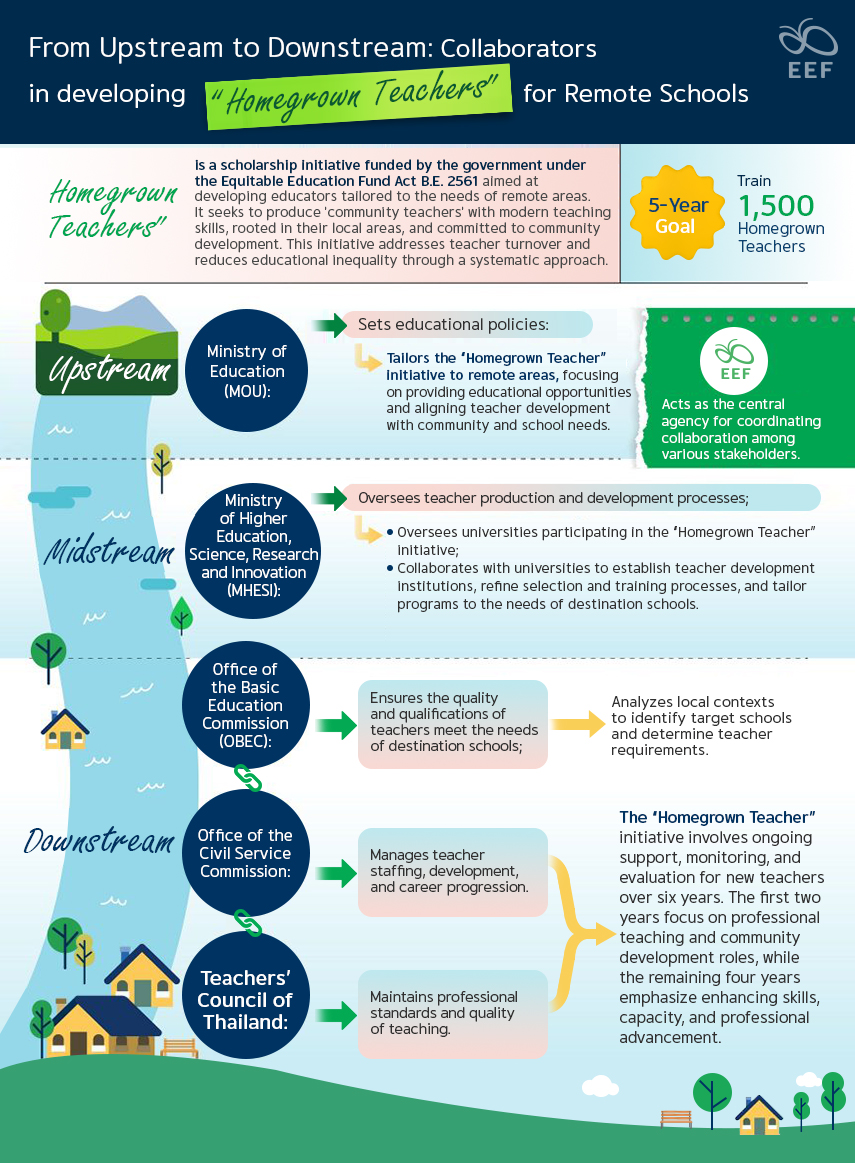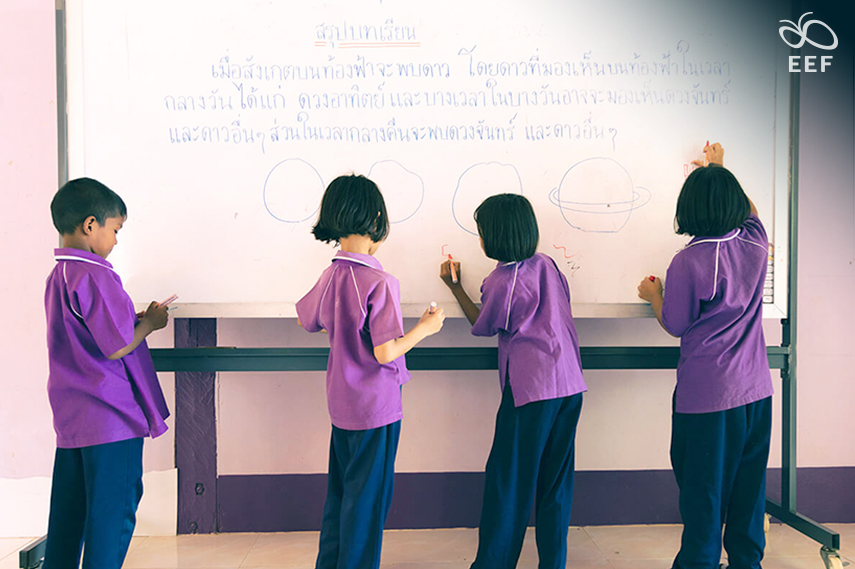
On Koh Yao Yai, the bond between teachers and communities has long been a cherished tradition. Historically, newly appointed teachers were welcomed and embraced warmly, with locals ensuring they felt integrated. This made the close-knit relationships between educators and residents a familiar sight. However, as the communities have evolved, this closeness has waned, leaving newcomers feeling somewhat isolated. Capable of rekindling these essential connections is none other than the employment of local teachers deeply rooted in the very communities they serve and familiar with their unique contexts and needs. This initiative encourages the two to work together through shared activities and resources, ensuring mutual support. By integrating locals into the teaching workforce, this approach not only strengthens the ties between schools and communities but also facilitates a more supportive and collaborative environment, both educational and beyond.
Among the local graduates contributing to this initiative is Nattawut Ngarnkhaeng, a fresh graduate from Yala Rajabhat University’s esteemed primary education program as part of the “Homegrown Teacher” initiative. He is poised to return to teach at Ao Mamuang School on Koh Yao Yai, viewing this opportunity as both challenging and rewarding: Ngarnkhaeng recognizes that quality teaching has the potential to profoundly impact students’ futures and sees his role as a teacher as a way to contribute to his community. The return of local teachers like him not only bolsters educational outcomes but also strengthens Koh Yao Yai’s cultural traditions, fortifying its sense of unity.

The island’s deep connection to Islam — with 90% of the population practicing and 20 mosques scattered across the landscape, making them a defining feature of the island — underscores the significance of specialized religious education. Traditionally, Islamic teachings were imparted either at local mosques with “Toh Kru” (Islamic scholars) or at “Pondok” (Islamic schools). However, due to limited local resources, many parents opt to send their children to study religion in other provinces like Yala, Phuket, and Trang. This separation often strains family bonds and affects the children’s educational continuity and outcomes, with some returning home without completing their studies due to financial constraints or lack of parental oversight.
To address this, Ao Kapor School has innovatively integrated Islamic teachings with the national curriculum, offering an Islamic Studies program that encompasses both religious studies and the core curriculum. This approach ensures that students receive a holistic education while staying close to their families. Supporting this effort is the arrival of Siriphong Thainapreaw, another local graduate from Yala Rajabhat University’s primary education program as part of the Homegrown Teacher initiative. His deep-rooted connections and understanding of the community have enhanced the school’s involvement in local activities, from birth celebrations to funerals, ensuring that educational and community efforts are seamlessly integrated. With this dynamic and engaging model of education, Thainapreaw views his role as extending beyond traditional teaching to that of a community developer. Employing local talents like him not only enhances educational outcomes but also fortifies community cohesion.
The issue of frequent teacher turnover is a persistent problem at schools on Koh Yao Yai. Teachers typically stay just 1-2 years before transferring elsewhere, leading to frequent disruptions in students’ learning, albeit with teachers from other subjects being called upon to fill in temporarily. In response, efforts have been made to encourage locals who had trained as teachers elsewhere to return and teach within their home communities. Central to this effort is the Homegrown Teacher initiative, which fosters and supports local talents like Nattawut Ngarnkhaeng and Siriphong Thainapreaw. This initiative not only alleviates turnover but also aligns with a vision of “developer-teachers” who see their role as integral as much to teaching as to community development.
The Homegrown Teacher initiative stands as a beacon of revitalization and unity for Koh Yao Yai, designed to retain and empower local talent while keeping education deeply rooted in the island’s cultural and religious heritage. By fostering a local teaching workforce, this initiative not only improves academic outcomes but also strengthens community bonds, creating a supportive environment for both educators and students. Embodying this vision are Ngarnkhaeng and Thainapreaw — along with their fellow homegrown teachers — themselves, seamlessly integrating their local insights with the national curriculum. This approach eliminates the need for families to send their children away for religious education, thereby reinforcing community bonds. Through their involvement, these teachers drive collaborative efforts, benefitting both schools and residents alike, from opening school facilities for community uses to participating in local events. As Koh Yao Yai continues to evolve, the shared commitment of its people, bolstered by the Homegrown Teacher initiative, promises a future where education and community thrive in harmony, fostering a resilient and unified island.

On Koh Yao Yai, the intricate interplay between home, mosque, and school forms the foundation of a vibrant and cohesive community. Customarily, local teachers were embraced as integral members of both educational and communal life, fostering a close-knit connection with their surroundings. However, evolving dynamics have introduced challenges, such as teacher turnover and the strain on family bonds due to the need for external religious education. Addressing these issues, the Homegrown Teacher initiative seeks to revitalize this tradition by integrating local talent into schools, ensuring that education remains deeply connected to the island’s cultural and religious heritage. Simultaneously, the commitment of local educators like Nattawut Ngarnkhaeng and Siriphong Thainapreaw enhances the synergy between home, mosque, and school. This holistic approach not only strengthens educational outcomes but also fortifies community ties, fostering a resilient and unified Koh Yao Yai.

Teachers play a pivotal role in schools and their communities, a fact that is particularly true for remote areas where their impact is magnified. Developing effective educators for these challenging environments requires a coordinated effort among various stakeholders. But what does it take to cultivate a “Homegrown Teacher” for remote schools, and who is involved in this crucial process?
A single teacher can have a profound impact, particularly in remote areas where they become integral parts of their communities. The challenge of teacher shortages in small, isolated schools extends beyond mere numbers, as many teachers seek to return to their hometowns due to difficulties adapting to local lifestyles, cultures, and languages. This often results in frequent relocations, disrupting school operations and leaving some schools understaffed for extended periods. To address this, the Homegrown Teacher initiative aims to develop over 1,500 new teachers across five generations. This program seeks to create high-quality educators who are both skilled and deeply embedded in their communities, and committed to transforming their communities. This not only reduces the turnover and mismatch issues often faced in remote areas but also contributes to breaking cycles of generational poverty and driving meaningful change within families and local contexts. Key players in this development include:
- Ministry of Education (MOE), ensuring that educational policies are effectively designed and the initiative is tailored to meet the needs of remote areas, focusing on enhancing local education and community development;
- Ministry of Higher Education, Science, Research and Innovation (MHESI), ensuring that collaboration with universities results in the development and refinement of teacher training programs that align with local needs and contexts;
- Office of the Basic Education Commission (OBEC), ensuring that quality standards are defined and target schools are identified to place teachers where they are most needed;
- Office of the Teacher Commission (OTC), ensuring that teacher staffing, development, and professional growth are effectively managed;
- Teachers’ Council of Thailand, ensuring that the performance of new teachers is monitored and evaluated, focusing on their roles as educators and community developers.
In October, the initiative will see 327 Homegrown Teachers start their roles in 285 remote schools, representing a significant step towards improving education and strengthening community ties in these areas.

The “Homegrown Teacher” initiative tackles the urgent issues of teacher shortages and high turnover in remote areas by emphasizing the recruitment and training of local educators. This strategy, which integrates teachers into their own communities, not only mitigates disruptions caused by frequent relocations but also enhances the bond between schools and local cultures, leading to improved educational outcomes. With support from various stakeholders, including government ministries and educational bodies, the initiative aims to deploy over 1,500 new teachers, marking a major step forward in local education.
The Homegrown Teacher initiative, a scholarship program under the Equitable Education Fund (EEF) Thailand’s Education Security initiative, addresses educational inequality by supporting underprivileged and marginalized students in remote areas who exhibit exceptional academic performance, a passion for teaching, and a calling to become educators. The Education Security initiative combines grassroots efforts with strategic data analysis to serve as a safety net for at-risk students, ensuring they remain within school and reach their full potential. Through its “Home – Mosque – School” model, the Homegrown Teacher initiative aligns with the EEF’s founding principle of reducing educational inequality through research, collaboration, and targeted support. This approach bridges gaps between educational needs and community engagement, advancing Thailand’s national vision for improved educational outcomes and social cohesion.

